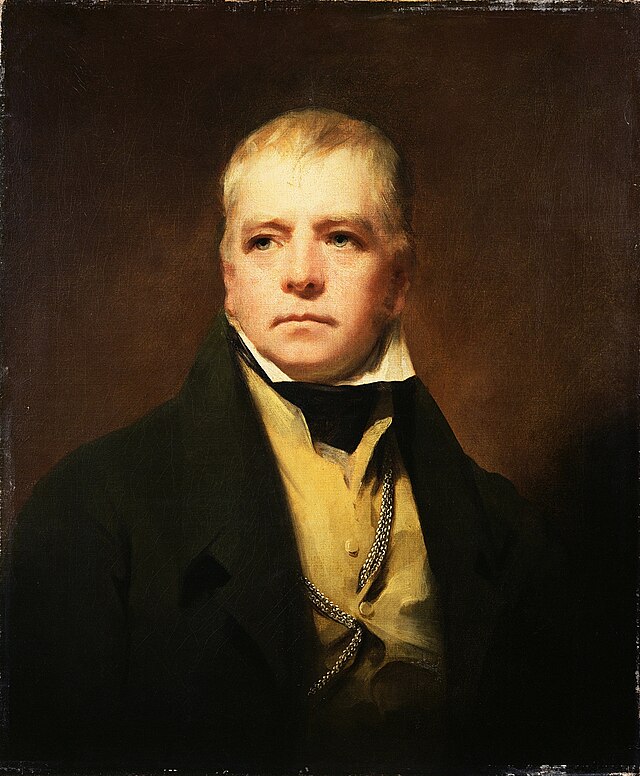Famous Scots. Sir Walter Scott.

Sir Walter Scott (1771–1832), a Scottish novelist, poet, historian, and biographer, is widely regarded as both the inventor and greatest practitioner of the historical novel. Raised in Edinburgh, he developed a profound love for Scottish history and landscape, fueled by his relatives’ stories of the Scottish Border and his voracious reading. Possessing an excellent memory, he was educated at Edinburgh’s High School and apprenticed as a solicitor but diverted much of his energy into reading in several foreign languages and social activities. After an early disappointment in love, he married Charlotte Carpenter in 1797 and enjoyed a happy marriage until her death in 1826.
In the 1790s, Scott developed an interest in German Romanticism and Scottish border ballads. His first major success came with the ballad collection Minstrelsy of the Scottish Border (1802–03). He followed this by writing popular full-length narrative poems, including The Lay of the Last Minstrel (1805) and the highly successful The Lady of the Lake (1810), establishing himself as a leading literary figure. Despite his literary earnings and supplementary income from legal appointments, his finances became disastrous due to his secret partnership in a printing and publishing firm, Ballantyne, leading him to write partially to pay off accumulating debts, a pressure exacerbated by the ruinous expense of building his country house, Abbotsford.
Tiring of narrative poetry, which was being eclipsed by Lord Byron’s work, Scott rediscovered an unfinished novel manuscript in 1813 and rapidly completed Waverley in 1814. Published anonymously, the novel was an immediate success and is considered a founding work of the historical novel genre, reinterpreting the loyalties of a vanished Scottish Highland society during the Jacobite rebellion of 1745.
The “Waverley” novels demonstrated Scott’s full literary gifts: a master storyteller who placed vivid, varied characters in exciting historical settings; a master of dialogue using both expressive Scottish regional speech and polished aristocratic language; and a penetrating social historian who depicted the whole range of Scottish society, focusing notably on ordinary people rather than just royalty. His writing style was rich, ornate, and blended energy with decorum. Following Waverley, he produced a series of masterpieces set in Scotland, including Old Mortality (1816) and The Heart of Midlothian (1818). Later, driven by debt and public demand, he turned to other histories, writing classics like the 12th-century English novel Ivanhoe (1819), the highly successful Quentin Durward (1823) set in 15th-century France, and the Crusades-era novel The Talisman (1825).
The complexity of his best novels stems from his ambivalence towards Scotland’s past: he welcomed the commercial benefits of the union with England but regretted the decline of Scotland’s national independence and heroic traditions. His novels often highlight how the older, heroic Jacobite path had no place in the modern, commercially prudent Scottish-British future.
Scott’s immense earnings could not prevent a catastrophic financial collapse in 1825. His deeply intertwined finances with publisher Archibald Constable and the Ballantynes led to his ruin when the 1825 financial crash caused creditors to demand immediate payment. Scott courageously assumed personal responsibility for his and the Ballantynes’ debts, totaling about £120,000, and dedicated the remainder of his life to writing compulsively to pay them off. While his rapid production continued, the strain of work shortened his life, and his later works didn’t match the quality of his early masterpieces. His authorship of the “Waverley” novels was finally made public in 1827. His health deteriorated sharply in 1831, and he died in Abbotsford in 1832.
Scott is credited with virtually inventing the historical novel by blending contemporary novel techniques—such as the omniscient narrator, regional speech, and sophisticated characterization—with his deep interest in history and antiquarian lore. His influence on European and American novelists was immediate and profound, securing his enduring reputation.
Discover more from WILLIAMS WRITINGS.
Subscribe to get the latest posts sent to your email.













Leave a Reply